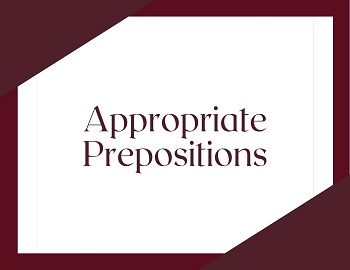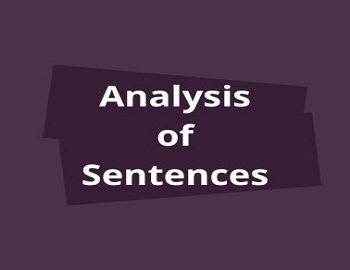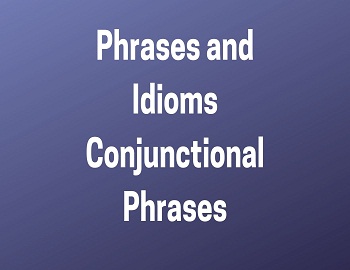Appropriate Prepositions:
- Abstain from- I abstain from liquor.
- Abide by- I will abide by my promise.
- Abound in- Flowers abound in the garden.
- Abound with- The garden abounds with flowers.
- Absent from- He has been absent from school today.
- Accede to- The Principal acceded to my request.
- Access to- I have an easy access to the Chief Minister.
- Account for- You must account for your failure.
- Accuse of- He was accused of theft.
- Accustom to- I am not accustomed to hard labour.
- Acquainted with- She is acquainted with me.
- Acquit of- The judge has acquitted him of all the charges.
- Act upon- If you act upon my advice, you will be successful.
- Adjacent to- Our house is adjacent to the hospital.
- Advantage of- We should not take advantage of his weakness.
- Admit into- He was admitted into the tenth class.
- Afraid of- I am afraid of my teacher.
- Affection for- She has no affection for her step-children.
- Agree with (a person), to (a proposal)- I agree with you; I agree to your proposal.
- Aim at- The hunter aimed at the pigeon and killed it.
- Alarm at- All of us were alarmed at the sight of a lion.
- Alive to- I am alive to my weakness.
- Alive with- Amirakadal is always alive with customers.
- Allot to- Land has been allotted to the refugees.
- Angry with (a person), at (a thing)- He is angry with me for nothing; He is angry at my harsh behaviour.
- Annoy with (a person), at (a thing)- He is annoyed with me without any reason; I am annoyed at his rude behaviour.
- Answer for- Everybody has to answer for his sins.
- Anxious about- I am anxious about my result.
- Anxious for- I am anxious for the safety of my brother.
- Apply to, for- I applied to the Director of Education for the post of a teacher.
- Approve of- My proposal was not approved of.
- Applicable to- This rule is also applicable to my case.
- Appetite for- He has no appetite for worldly things.
- Appoint to- The Government has appointed him to this post.
- Arrive at- The train arrived at the station.
- Ashamed of- You should be ashamed of your conduct.
- Astonish at- I am astonished at the failure of a brilliant student.
- Avail of- They availed themselves of the opportunity.
- Aware of- He is not aware of his weakness.
- Become of- What has become of your watch?
- Believe in- I believe in the existence of God.
- Belong to- He belongs to a noble family.
- Bent on or upon- He is bent on (upon) doing harm to me.
- Beware of- Beware of selfish people.
- Bless with- My friend is blessed with a boy-baby.
- Blind of, to- The beggar is blind of both the eyes; Do not be blind to your short-comings.
- Boast of- Do not boast of your riches.
- Born of, in, to- He is born of rich parents; He is born in a rich family; A son is born to her.
- Bound for- The ship is bound for India.
- Break into- The Thief broke into the house.
- Break in- The coachmen is breaking in the horse.
- Beneficial to- Exercise is beneficial to health.
- Bestow on or upon- A title was bestowed on (upon) him by the government.
- Candidate for- He is also a candidate for this post.
- Capable of- He is capable of doing wonders.
- Care of, for- Mother takes care of her baby; She does not care for her health.
- Charge with- He is charged with theft.
- Commence on- Our examination commences on next Monday.
- Commit to- Can you commit this lesson to memory?
- Compare with, to- Comapre this picture with that; The hero can be compared to a lion.
- Complain against, of- I complained to the post-master against the postman; He complains of pain in the back.
- Congratulate on (upon)- I congratulated him on (upon) his brilliant success.
- Control over- The teacher has no control over the class he teaches.
- Call in, at, for- The doctor was called in; I called at his house; His conduct calls for an explanation.
- Conceal From- I conceal nothing from you.
- Correspond with- I have corresponded with him on this matter.
- Correspond to- This angle corresponds to that angle.
- Deal in, with, at- He deals in books; I do not want to deal with dishonest fellows; Which bank do you deal at?
- Deaf to- The Headmaster is deaf to our request for an excursion.
- Dear to- Good students are dear to their teacher.
- Deficient in- He is deficient in Science.
- Demand for- There is a great demand for home made goods.
- Deliver to- He has delivered my goods to me.
- Depend upon- I wholly depend upon my aunt.
- Deprive of– The spoiled son was deprived of his paternal property.
- Desire for- Indians had a strong desire for freedom.
- Desirous of- I am desirous of buying a sports car.
- Devoted to- A loyal servant is always devoted to his master.
- Differ with, from- I differ with you on this point; This book differs from that in its get up.
- Disgusted with- He is disgusted with the behaviour of his own people.
- Dismiss from- The corrupt employee was dismissed from service.
- Down with- He is down with fever.
- Dream of- More things are done by prayers than this world dreams of.
- Duty to- He must do his duty to his motherland.
- Eager for- She is eager for success.
- Eligible for- You are eligible for the post.
- Employed in- My uncle is employed in the post office.
- Endowed with- Great men are endowed with talents.
- End in- All my efforts to get a first class ended in smoke.
- Engage in, to, with- He is engaged in composing a poem, My brother is engaged to a princess; She has an engagement with me in the evening.
- Enquire of, into- The Headmaster enquired of the teacher about the class; The police is enquiring into the case.
- Entitled to- In democracy every adult is entitled to a vote.
- Entrust to, with- Entrust this work to her; He is entrusted with much responsibility.
- Envy at- We should not envy at the sucess of others.
- Envious of- We should not be envious of the sucess of others.
- Equal to- This angle is equal to that.
- Escape from- The prisoner escaped from the prison.
- Essential for (to)- Exercise is essential for (to) health.
- Exchange for- I exchanged my watch for a camera.
- Expose to- He is exposed to danger.
- Exempt from- I was exempted from tution fee.
- Fail in- He failed in the first attempt.
- Faith in- A devotee has staunch faith in God.
- Faithful to- The servant is faithful to his master.
- Familiar with, to- He has become quite familiar with his new neighbour; Your face is quite familiar to me.
- False to- One should be false to one’s friends.
- Famous for- Kashmir is famous for her silk goods.
- Favourable to- These terms are quite favourable to you.
- Feed on- The cow feeds on hay and grass.
- Feel for- The rich should feel for the poor.
- Fight with, against, for- Why do you fight with me for nothing?; Our Government is fighting against poverty and corruption; We should fight for the defence of our country.
- Fill in, with- Fill in the blanks with Prepositions; On seeing her dead son, my eyes were filled with tears.
- Fond of- She is fond of singing.
- Furnish with- The walls are furnished with pictures.
- Friendly to- Be friendly to the poor and needy.
- Fall out- Children fall out over trifles.
- Fall through- All his schemes fell through for want of money.
- Free from- He is free from all worries.
- Fit for- He is quite fit for the job.
- Gifted with- He is gifted with a sweet voice.
- Glad at- All of us felt gald at your success.
- Glad of- I am glad of your company.
- Good at- He is good at figure work.
- Grateful to- I am grateful to you for your help.
- Grieve at- Everybody was deeply grieved at the death of Mahatma Gandhi.
- Guard against- Guard yourself against exposure in winter.
- Guilty of- John was found guilty of murder.
- Give way- The roof gave way under heavy rains.
- Give away- The President gave away the prizes.
- Give in- The brave never give in easily.
- Give out- He gave out that he had left the company of spoiled youth.
- Give off- The rose gives off sweet fragrance.
- Get Over- He got over the difficulties by dint of hard labour.
- Hanker after- Covetous people hanker after wealth.
- Happen to- What has happened to his sister?
- Hard of- The old man is hard of hearing.
- Hope for- Always hope for the best.
- Hope of- She has no hope of success.
- Harmful to- Dirt is harmful to our health.
- Hear of- Have you heard of her success?
- Indebted to- I am much indebted to you for your timely help.
- Ignorant of- He is ignorant of the rules of the college.
- Ill with- She is ill with fever.
- Impose on- The headmaster imposed a fine of hundred rupees on John.
- Indulge in- Never indulge in evil pursuits.
- Indifferent to- Don’t be indifferent to my requests.
- Infested with- The house is infested with rats.
- Inferior to- Your pen is inferior to mine.
- Injurious to- Smoking is injurious to health.
- Inquire into- The police is inquiring into the matter.
- Inquire after- I called upon her to inquire after her health.
- Inquire of- The headmaster inquired of the teacher about the class.
- Insist on- Do not insist on going there.
- Inspire with- His rousing speech inspired us with courage.
- Inflict on- The robber inflicted many wounds on the woman.
- Imaprt to- Our teachers imparted sound knowledge to us.









Comments (No)